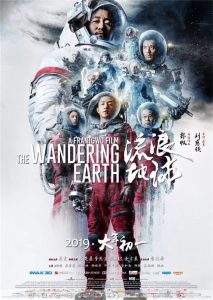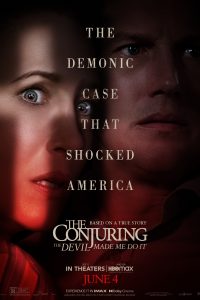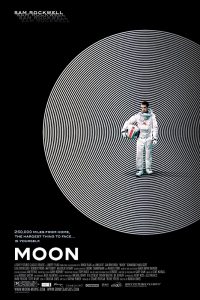Not All Who Wander: Arley Sorg and Josh Pearce Discuss The Wandering Earth
 Cixin Liu’s Remembrance of Earth’s Past trilogy (The Three-Body Problem, The Dark Forest, and Death’s End) established him to audiences as a writer of Big Idea stories, eliciting comparisons to Arthur C. Clarke. The Wandering Earth (original title: Liu Lang Di Qiu) based on his novella of the same name, cements that reputation with a grand-scale, hard SF story that will appeal to fans of many science fiction genres.
Cixin Liu’s Remembrance of Earth’s Past trilogy (The Three-Body Problem, The Dark Forest, and Death’s End) established him to audiences as a writer of Big Idea stories, eliciting comparisons to Arthur C. Clarke. The Wandering Earth (original title: Liu Lang Di Qiu) based on his novella of the same name, cements that reputation with a grand-scale, hard SF story that will appeal to fans of many science fiction genres.
At the start of the film, the Sun is expanding, and humanity has built giant rocket engines around the globe in order to launch the Earth on a 2,500-year journey to the Alpha Centauri system, which will become its new home. Astronaut Liu Peiqiang (Jing Wu) is assigned to the space station providing navigational guidance to the Earth, leaving behind his young son Liu Qi (Chuxiao Qu) in the care of the boy’s grandfather, Han Ziang (Man-Tat Ng).
Seventeen years later as the Earth approaches Jupiter for a gravity assist, a “gravitational spike” causes heavy destruction to the rocket engines and remaining cities. Liu Qi, his sister Han Duoduo (Jin Mai Jaho), and Han Ziang make their way across Earth’s frozen surface as humankind searches for a way to restart the disabled thrusters and prevent the Earth from crashing into Jupiter.
Arley: This is like a disaster movie meets a real SF movie.
Josh: This movie is strange because it’s got all these things we’ve seen before, or heard of before, but never combined in quite such a way. The Clarke comparison is easy to make because the station robot, MOSS, sounds a lot like HAL from 2001, and also like GERTY from Moon or the ship’s robot in WALL-E. So the scenes on the space station are familiar—
Arley: It also has elements of Gravity.
Josh: —and then on the ground there are situations that reminded me of The Day After Tomorrow, The Core, Armageddon, Sunshine, Snowpiercer, maybe a reverse Melancholia, all these typical disaster movies, so I expected a level of predictability in The Wandering Earth, but it continued to surprise me throughout. And this is a fairly long movie, so that’s quite an accomplishment, to sustain that feeling in the audience.
Arley: It’s a surprisingly complex movie nested in a really simple framework. Every line sets something up later and gets referenced back to. When I saw in the credits that there were six writers, it made sense. But it wasn’t like other movies that feel like the writers are working against each other.
Running through the center of all the action and danger is a solidly emotional character story, touching on themes of community, responsibility, fatherhood, and collaboration. The central character trio of son, father, and grandfather set up almost all of these themes in an early, quiet scene, relating a significant amount of material in a single, info-dense conversation that still manages to be sweet and personal without getting mired down in the volume of information that the audience will need later on in the movie. Apart from those three and perhaps two or three other characters introduced later, the wide cast of side characters were generic and interchangeable.
Josh: The grandfather was one of my favorite characters, but I really thought the sister was going to be the main character. She’s the first character shown as the Earth approaches Jupiter. Everything else before that has been prologue so, essentially, the movie is opening on her. I expected her to have an important role at the end but, unfortunately, she is far underplayed.
Arley: Women are a plot device in this movie. The only other one is a nameless, faceless soldier who gets yelled at for reacting emotionally and shooting something. The main character’s mother is literally fridged.
Josh: They only showed her on her deathbed, didn’t they? I’d say the astronaut was the one who got literally fridged, because they put him in a cryogenic pod.
Arley: The biggest nod to any kind of diversity in the film (including women) was a single shot on the space station, which had a diverse crew in the background, implying all these people can become astronauts. And it’s undermined later because a group of Indonesians are shown fleeing their posts as cowards. Interesting to note that there are no American characters at all. The British group has a brief scene at the end but that’s the only English-speaking moment.
Josh: One last thing I liked about the characters is that the main protagonists are everyman, working-class hero types, which gave it kind of a Philip K. Dick feel. His protagonists were construction workers, tire-repairmen, blue collar types. They weren’t leaders of industry or adventuring space captains.
Arley: You associate that with PKD and science fiction, but I associate it with Chinese cinema, which is often centered around working-class culture.
The Wandering Earth is not only a film of big ideas, but also one of big visuals. Gorgeous shots of the Earth trailing a tail of fusion fire as it flies through space. Cityscapes trapped in ice. Jupiter overwhelming the horizon as the characters come across a whale frozen in mid-breach. But the smaller details are what set it apart from CGI blockbusters. There’s a scene in which Liu Peiqiang looks out the window of the space station and the audience can see, reflected in the glass, Jupiter spinning in time to the station’s rotation. Other science fictional elements further build this world’s foundations: the inflatable bubble that Liu Qi uses; his robot hand; the military’s powered armor; real-time translation devices. All these not only look cool in a technopunk way, but also serve as Chekhov’s guns that come into play later on.
Attention to detail is a little bit scattered in other areas of the movie, though, especially near the beginning when so much is presented at once, skipping over explanations of many technical aspects. Why is the sun suddenly expanding? How is there enough fuel to send the planet on an interstellar journey? Is the Earth structurally sound enough to withstand this force? Why are the cities located directly beneath these fusion rockets (arguably the most dangerous place for them to be)? How are the outside scenes so brightly lit when the Earth is now at Jupiter’s orbit? What, exactly, is a gravitational spike?
All these nitpicking issues are reduced to background noise when the film narrows its focus from reaching a distant star down to escaping Jupiter’s gravity, and narrows the stakes from the fate of humanity down to a father/son relationship. There’s only one way for The Wandering Earth to continue on, and it’s there from the beginning. Setting up the solution so the audience gets it right before the character does is very satisfying.
Josh: I like how they set up this 2,500-year journey and they get into trouble at Jupiter. Like, you’ve been traveling for a minute.
Arley: I thought it was a good movie. Not flawless, but in some ways it’s kind of a masterpiece. We could say more but this movie just needs to be watched.
Josh: Definitely worth seeing. It’s a scale of science fiction we don’t see in cinema except maybe in Interstellar.
Directed by: Frant Gwo
Written by: Gong Geer, Junce Ye, Yan Dongxu, Frant Gwo & Yang Zhixue, based on a story by Cixin Liu.
Starring: Chuxiao Qu, Jing Wu, Guangjie Li, Man-Tat Ng, Jin Mai Jaho, Mike Kai Sui, Hongchen Li, Jingjing Qu, Yichi Zhang, Haoyu Yang, Zhigang Jiang, Huan Zhang, Jiayin Lei, Arkadiy Sharogradskiy, Hao Ning & Yi Yang.

JOSH PEARCE, Assistant Editor, started working at Locus in 2016. He studied creative writing at SFSU and has sold short stories and poems to a variety of speculative fiction magazines. Born and raised in the Bay Area, he currently lives in the East Bay with his wife and son and spends way too much time on Twitter: @fictionaljosh. One time, Ken Jennings signed his chest.
ARLEY SORG, Associate Editor, grew up in England, Hawaii, and Colorado. He studied Asian Religions at Pitzer College. He lives in Oakland, and usually writes in local coffee shops. A 2014 Odyssey Writing Workshop graduate, he is soldering together a novel, has thrown a few short stories into orbit, and hopes to launch more.
 While you are here, please take a moment to support Locus with a one-time or recurring donation. We rely on reader donations to keep the magazine and site going, and would like to keep the site paywall free, but WE NEED YOUR FINANCIAL SUPPORT to continue quality coverage of the science fiction and fantasy field.
While you are here, please take a moment to support Locus with a one-time or recurring donation. We rely on reader donations to keep the magazine and site going, and would like to keep the site paywall free, but WE NEED YOUR FINANCIAL SUPPORT to continue quality coverage of the science fiction and fantasy field.
©Locus Magazine. Copyrighted material may not be republished without permission of LSFF.







